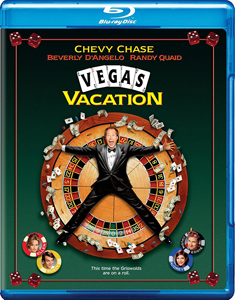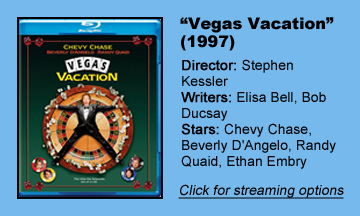Although not as much of a classic as “Vacation” (1983) and “Christmas Vacation” (1989), “Vegas Vacation” (1997) proves that National Lampoon’s series chronicling Griswold family hijinks can be funny and likeable without John Hughes at the keyboard.
Screenwriter Elisa Bell and director Stephen Kessler don’t reinvent either this series or the idea of a “Vegas episode,” but they ably showcase the talent and visuals on hand.
More pronounced threads
“Vegas Vacation” – the saga’s fourth entry — is less gut-busting than Hughes’ two classics, but it’s easy to watch. It follows the formula of Clark (Chevy Chase) becoming obsessed with something and temporarily losing sight of what’s important.
But the threads for each of the four characters are more pronounced than before. Clark gets addicted to gambling, Ellen (Beverly D’Angelo) falls under the spell of Wayne Newton, Rusty (Ethan Embry) becomes a big shot, and Audrey (Marisol Nichols) cuts loose under the bad (but maybe not so bad after all) influence of pole dancer cousin Vicki (Shae D’lyn).
It was already apparent, but it’s even clearer now that Cousin Eddie (Randy Quaid) adds the spice that completes the recipe of a good “Vacation” film; he’s notably absent from the dud that is “European Vacation” (1985).
The most laugh-out-loud funny segment comes at Eddie’s spread outside town. The former government land is radioactive, the place is crawling with more offspring than “The Simpsons’ ” Spuckler family, and the jokes almost write themselves. Eddie grills chicken on rocks, the kids entertain themselves by catching snakes, and Vicki is Eddie’s pride and joy – making a living with the dance moves he taught her.
There’s a decent segment where Clark gets separated from the tour at Hoover Dam; it features the biggest use of CGI so far in the series as Clark swings on a wire onto the dam wall. The “dam” jokes did work on me, I admit.
What happens in Vegas
But mostly this is about Las Vegas, as it should be. In Sin City, Wayne Newton – as “himself” – is a suave entertainer who likes Ellen but seems to respect the fact that she’s married – at first. We gradually see he’s a nutso celebrity, and it’s confirmed when he gifts Ellen a lock of his hair.
Although it helps to cast “The Princess Bride’s” Wallace Shawn as the blackjack dealer who continually defeats and taunts Clark, the movie goes back to this gag too much without getting to a payoff.
The arcs for the two kids are amusing in expected ways, but the actors add a lot. Embry (“Empire Records,” “Can’t Hardly Wait”) is his usual likable self as the mildly dorky teen who we root for, and Nichols is the first sexualized version of Audrey, although her sweet side remains too.
She’d later have a decent role on “24” and is now a “Riverdale” regular, but watching Nichols in “Vegas Vacation,” it’s stunning that she didn’t land tons of lead movie roles.

Although they are new to the series, Bell and Bob Ducasy (co-credited on the story) display familiarity with the “Vacations.” The biggest wink at the audience – and a good one – comes when workaholic Clark laments that he hardly recognizes his own kids anymore and the camera holds on Rusty and Audrey for an extra beat.
Recasting, again
The writers embrace the oddity of the constant recasting of the roles and rework it as an in-joke. (Yet a fifth Rusty, Ed Helms, would be cast for 2015’s “Vacation.”)
I don’t think we’re meant to see arcs play out for the two kids over the four films (the idea of Dana Hill and Nichols being the same person is insane), but their storylines here are a tad more mature, so this plays as a nice sendoff for the Chase-starring portion of the saga.
We can imagine Rusty and Audrey will be leaving the nest soon, and this might be the last family vacation where Clark can impart fatherly wisdom.
It’s slightly disappointing that there’s not even a pretense of depth to his lessons. Clark’s thread could play as a warning against gambling except for the comedy going on all around it. Both Rusty’s ridiculous luck and Clark’s miraculous recovery of his losses are absent of any sense of reality; they happen at the stroke of a screenwriter’s pen.
Nonetheless, “Vegas” stands as the hidden gem among the “Vacations.” So often at this point in a series, plots become extreme and characters become cynical, but “Vegas Vacation” doesn’t fall into those traps; it remembers what works and emphasizes those things.
It could stand to have more big laughs, but the Griswold family values remain at the core, and that’s worth a smile.


